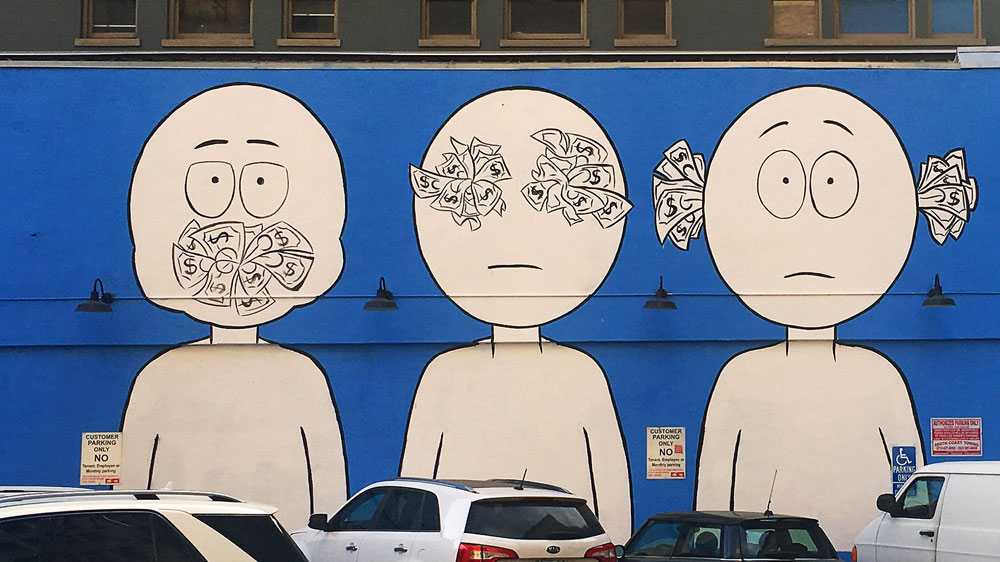
After a historic and contentious election cycle, Americans are reevaluating how the voices of its citizens are accounted for—not only through the electoral college, but through political campaigns. Last week, the Democracy for All amendment was reintroduced to overturn the controversial 2010 Supreme Court decision on campaign finance, Citizens United v. Federal Election Commission (FEC).
Supporting the measure are 221 members of Congress, led by representatives Ted Deutch (D-FL), Jim McGovern (D-MA), Jamie Raskin (D-MD), and John Katko (R-NY). The measure has the title of House Joint Resolution 1, and the proposed US constitutional amendment reads as follows:
Section I. To advance democratic self-government and political equality, and to protect the integrity of government and the electoral process, Congress and the States may regulate and set reasonable limits on the raising and spending of money by candidates and others to influence elections.
Section II. Congress and the States shall have power to implement and enforce this article by appropriate legislation, and may distinguish between natural persons and corporations or other artificial entities created by law, including by prohibiting such entities from spending money to influence elections.
Section III. Nothing in this article shall be construed to grant Congress or the States the power to abridge the freedom of the press.
Of course, for a US constitutional amendment to pass requires clearing a very high bar, involving a two-thirds majority in both houses of Congress and the approval of 38 of 50 state legislatures. Often, amendments have to be proposed in multiple sessions of Congress before clearing that two-thirds hurdle, as is the case with the effort to amend the Constitution to reverse the US Supreme Court’s Citizen United decisions.
While passing a constitutional amendment is a tall order, the stakes are high. As the late Supreme Court Justice Ruth Bader Ginsburg once shared, “If there was one decision I would overrule, it would be Citizens United. I think the notion that we have all the democracy that money can buy strays so far from what our democracy is supposed to be.”
Sign up for our free newsletters
Subscribe to NPQ's newsletters to have our top stories delivered directly to your inbox.
By signing up, you agree to our privacy policy and terms of use, and to receive messages from NPQ and our partners.
The Citizens United case, it should be recalled, centered on the conservative nonprofit Citizens United’s broadcasting and advertising of the critical documentary, Hillary: The Movie. The Federal Election Commission prohibited its broadcast because of a Bipartisan Campaign Reform Act (BCRA) provision barring corporations or unions from funding “electioneering communications” within certain timeframes before a primary or general election. The Court rejected the provision under the free speech clause of the First Amendment, permitting such groups to make unlimited election expenditures. (The decision did preserve a few limits, allowing the federal government to maintain disclaimer and reporting requirements, and to limit direct candidate contributions.)
Supporters claim that Citizens United boosts speech rights, but the decision is often described as bolstering “corporate First Amendment rights.” Michael Boos, vice president and general counsel of Citizens United, told ABC News last year during the tenth anniversary of the decision, “Money is speech, and that is a reality. Without money you can’t get your message out.”
Among the supporters of Citizens United decision, one also finds the American Civil Liberties Union (ACLU), which did “not support campaign finance regulation premised on the notion that the answer to money in politics is to ban political speech.” Instead, the ACLU proposed to critics:
In our view, the answer to that problem is to expand, not limit, the resources available for political advocacy. Thus, the ACLU supports a comprehensive and meaningful system of public financing that would help create a level playing field for every qualified candidate. We support carefully drawn disclosure rules. We support reasonable limits on campaign contributions, and we support stricter enforcement of existing bans on coordination between candidates and super PACs.
Yet, many contend that Citizens United has vitiated public democratic accountability, in effect creating the “best democracy money can buy” by empowering corporate interests and making it easier to make secret, anonymous donations through 501c4 social welfare organizations. The decision raised questions of the undue influence of political campaign spending from affluent donors, corporations and super PACs, along with issues of free speech, political corruption, and social equity for all citizens.
According to Deutch, one of the proposed constitutional amendment’s authors, “The Supreme Court’s decision in Citizens United put an unacceptable price of admission on American democracy. We cannot allow the wealthiest individuals and corporations to flood our elections with cash through complex webs of Super PACs and dark money groups that put special interests above the will of the American people.”
Statements of support from nonprofit organizations included Free Speech for People, American Promise, and Public Citizen. “The American people know that Citizens United embodies, perpetuates and locks in that rigged system,” says Robert Weissman, president of Public Citizen, in a statement. “That’s why by overwhelming numbers they favor a constitutional amendment to overturn Citizens United and related decisions that create an overclass of the wealthy few and consign the rest of us to political serfdom.”—Nicole Zerillo













